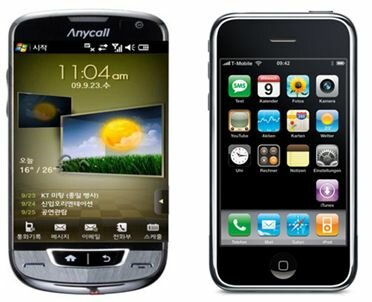The following post was written by an iPhonAsia reader who wishes to remain anonymous.
![]() Proud Samsung (now the largest conglomerate in the world) has opened up their bag of tricks to deal with the largely unanticipated threat of the iPhone. On the one hand they’ve hired some popular comedians to make an internet parody film (see below) poking fun at the iPhone’s supposed weaknesses (battery life and lack of good after service in Korea). “So there you are, your cute girl friend’s battery in her Samsung phone dies and she asks you to lend her yours, and you–with your iPhone–whatya gonna do?” etc. The fact that this is Samsung’s first such attack ad ever is widely seen as a sure sign of the company’s panic, since it has been less than two weeks since the iPhone began sales.
Proud Samsung (now the largest conglomerate in the world) has opened up their bag of tricks to deal with the largely unanticipated threat of the iPhone. On the one hand they’ve hired some popular comedians to make an internet parody film (see below) poking fun at the iPhone’s supposed weaknesses (battery life and lack of good after service in Korea). “So there you are, your cute girl friend’s battery in her Samsung phone dies and she asks you to lend her yours, and you–with your iPhone–whatya gonna do?” etc. The fact that this is Samsung’s first such attack ad ever is widely seen as a sure sign of the company’s panic, since it has been less than two weeks since the iPhone began sales.
 A sneakier and potentially more potent attack (orchestrated by anti-iPhone forces in South Korea) has been to use a wide variety of blogs and articles to hold forth comparisons between the iPhone and Samsung’s rival phone the Omnia II. Presenting a judicious set of specs that inevitably “demonstrate” (leaving out the problems with Windows Mobile OS and the complete lack of apps, etc.) how the Omnia is superior. The articles also clearly clue in well-trained Korean readers to the basic message: the Omnia may be much more expensive but it’s *our* country’s phone and it’s the patriotic choice.
A sneakier and potentially more potent attack (orchestrated by anti-iPhone forces in South Korea) has been to use a wide variety of blogs and articles to hold forth comparisons between the iPhone and Samsung’s rival phone the Omnia II. Presenting a judicious set of specs that inevitably “demonstrate” (leaving out the problems with Windows Mobile OS and the complete lack of apps, etc.) how the Omnia is superior. The articles also clearly clue in well-trained Korean readers to the basic message: the Omnia may be much more expensive but it’s *our* country’s phone and it’s the patriotic choice.
However, the “buy Korea” card has been played too often and likely won’t work this time, at least judging from the tenor of blog comments. And yesterday a major article appeared in the trendy citizen’s journal site ohmynews.com, which tends to have a leftist/populist/nationalistic slant on events, provocatively entitled: “If you acquire an iPhone are you a sell-out slave to the foreigners? … are you a ‘patriot’ if you buy a Korean phone?” Now, while nationalistic passions often flare here, this sort of rhetoric is almost never deployed in the press and certainly not over a commercial product.
The author goes on at length to review the gloomy history of how Korean companies have cleverly exploited patriotism to make consumers feel guilty for not supporting the home team.
For decades now up to the present, it has been the unspoken custom to understand that we Koreans are supposed to buy shoddy goods for an exorbitant price, so that they could be sold abroad cheaply in order to help out Korean companies. This is because we believed our side. However, those greedy companies still tell us, ‘Keep it up, things are a long way off. We still need to grow, so we can’t distribute [the profits to you]‘ … If we, the Korean consumers, don’t awake to our plight then in the future, too, they’ll just siphon money from our wallets at will, and we’ll be their cash cow. They not only have betrayed out trust, they are immoral … What should we do in the face of this sad irony that the more we buy Korean goods out of patriotism, the more diseased our system becomes?
 The article then details other sleazy ways in which consumers are misled to believe that domestic phones are superior to the iPhone and goes on to conclude dramatically, “Buying an iPhone is truly a patriotic act!” and ends with a flourish:
The article then details other sleazy ways in which consumers are misled to believe that domestic phones are superior to the iPhone and goes on to conclude dramatically, “Buying an iPhone is truly a patriotic act!” and ends with a flourish:
And so, gentle readers, what do you think? What is your opinion of iPhone, what facts do you believe, what opinions do you think are best? And beyond this, if you borrow an iPhone only briefly and try it out, then what would you say? Oh, and please remember this fact: if you swallow the iPhone, the red pill, then you will never be able to return.
The ohmynews.com site gets millions of hits a day and this article has received over 5047 plus votes vs. 426 minus, over 90% favorability rating, a huge turn-out.
From this and other similar blog articles it appears a powerful coalition of techies, anti-conglomerate activists, and patriotic consumers is forming for the iPhone: the perfect storm!



@gmtplus09 Thanks for the market history. Perhaps the walled-gardens in Korea are getting a long overdue hedge trim.
the patriotic-marketing gimmick was seen post-1997/IMF, with hyundai motor begging for consumers to buy local. pay more for the exact product that is export-bound, while depriving local buyers of key features (different grade steel–local cars are made of steel that rusts within 2 years, reduced menu of engine choices, etc.). also, iriver pulled similar stunt in the early-2000′s when the apple ipod started to put some serious hurt to its revenues